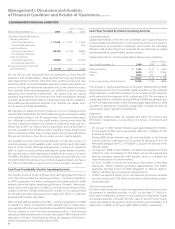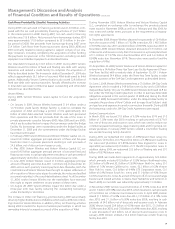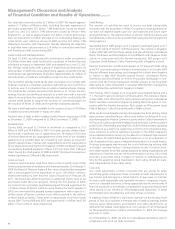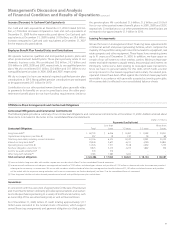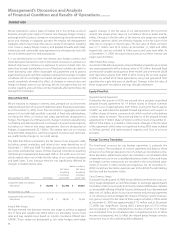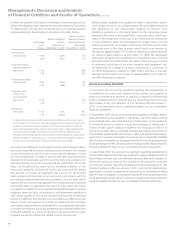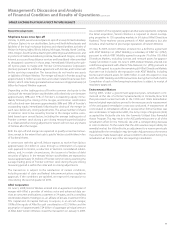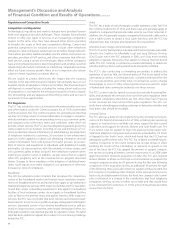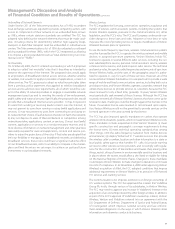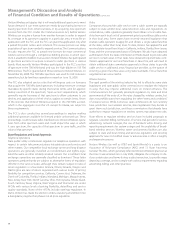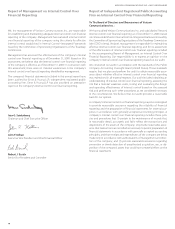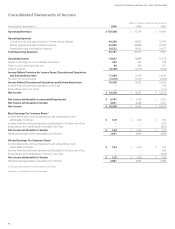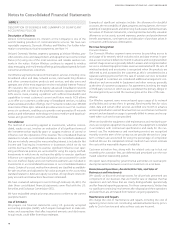Verizon Wireless 2009 Annual Report Download - page 40
Download and view the complete annual report
Please find page 40 of the 2009 Verizon Wireless annual report below. You can navigate through the pages in the report by either clicking on the pages listed below, or by using the keyword search tool below to find specific information within the annual report.38
Verizon Wireless anticipates that it will need additional spectrum to meet
future demand. It can meet spectrum needs by purchasing licenses or
leasing spectrum from other licensees, or by acquiring new spectrum
licenses from the FCC. Under the Communications Act, before Verizon
Wireless can acquire a license from another licensee in order to expand
its coverage or its spectrum capacity in a particular area, it must file an
application with the FCC, and the FCC can grant the application only after
a period for public notice and comment. This review process can delay
acquisition of spectrum needed to expand services. The Communications
Act also requires the FCC to award new licenses for most commercial
wireless services through a competitive bidding process in which spec-
trum is awarded to bidders in an auction. Verizon Wireless has participated
in spectrum auctions to acquire licenses for radio spectrum in various
bands. Most recently, Verizon Wireless participated in the FCC’s auction
of spectrum in the 700 MHz band, and was the high bidder on 109 700
MHz licenses. The FCC granted all of those licenses to Verizon Wireless on
November 26, 2008. The 700 MHz spectrum was used for UHF television
operations, but by law those operations ceased on June 12, 2009.
The FCC also adopted service rules that will impose costs on licensees
that acquire the 700 MHz band spectrum, including minimum coverage
mandates by specific dates during the license terms, and, for approxi-
mately one-third of the spectrum, “open access” requirements, which
generally require licensees of that spectrum to allow customers to use
devices and applications of their choice, subject to certain limits. Seven
of the licenses that Verizon Wireless acquired in the 700 MHz auction,
which in the aggregate cover the U.S. except for Alaska, are subject to
these requirements.
The FCC is also conducting several proceedings to explore making
additional spectrum available for licensed and/or unlicensed use. These
proceedings could increase radio interference to Verizon Wireless’s opera-
tions from other spectrum users and could impact the ways in which
it uses spectrum, the capacity of that spectrum to carry traffic, and the
value of that spectrum.
State Regulation and Local Approvals
Telephone Operations
State public utility commissions regulate our telephone operations with
respect to certain telecommunications intrastate rates and services and
other matters. Our competitive local exchange carrier and long distance
operations are generally classified as nondominant and lightly regu-
lated the same as other similarly situated carriers. Our incumbent local
exchange operations are generally classified as dominant. These latter
operations predominantly are subject to alternative forms of regulation
(AFORs) in the various states, although they remain subject to rate of
return regulation in a few states. Arizona, Illinois, Nevada, Oregon and
Washington are rate of return regulated with various levels of pricing
flexibility for competitive services. California, Connecticut, Delaware, the
District of Columbia, Florida, Indiana, Maryland, Michigan, Massachusetts,
New Jersey, New York, North Carolina, Ohio, Pennsylvania, Rhode Island,
South Carolina, Texas, Virginia, West Virginia and Wisconsin are under
AFORs with various levels of pricing flexibility, detariffing, and service
quality standards. None of the AFORs include earnings regulation. In
Idaho, Verizon has made the election under a statutory amendment into
a deregulatory regime that phases out all price regulation.
Management’s Discussion and Analysis
of Financial Condition and Results of Operations continued
Video
Companies that provide cable service over a cable system are typically
subject to state and/or local cable television rules and regulations. As
noted above, cable operators generally must obtain a local cable fran-
chise from each local unit of government prior to providing cable service
in that local area. Some states have recently enacted legislation that
enables cable operators to apply for, and obtain, a single cable franchise
at the state, rather than local, level. To date, Verizon has applied for and
received state-issued franchises in California, Indiana, Florida, New Jersey,
Texas and the unincorporated areas of Delaware. We also have obtained
authorization from the state commission in Rhode Island to provide cable
service in certain areas in that state, have obtained required state com-
mission approvals for our local franchises in New York, and will need to
obtain additional state commission approvals in these states to provide
cable service in additional areas. Virginia law provides us the option of
entering a given franchise area using state standards if local franchise
negotiations are unsuccessful.
Wireless Services
The rapid growth of the wireless industry has led to efforts by some state
legislatures and state public utility commissions to regulate the industry
in ways that may impose additional costs on Verizon Wireless. The
Communications Act generally preempts regulation by state and local
governments of the entry of, or the rates charged by, wireless carriers, but
does not prohibit states from regulating the other “terms and conditions”
of wireless service. While numerous state commissions do not currently
have jurisdiction over wireless services, state legislatures may decide to
grant them such jurisdiction, and those commissions that already have
authority to impose regulations on wireless carriers may adopt new rules.
State efforts to regulate wireless services have included proposals to
regulate customer billing, termination of service, trial periods for service,
advertising, network outages, the use of handsets while driving, and
reporting requirements for system outages and the availability of broad-
band wireless services. Wireless tower and antenna facilities are also
subject to state and local zoning and land use regulation, and securing
approvals for new or modified tower or antenna sites is often a lengthy
and expensive process.
Verizon Wireless (as well as AT&T and Sprint-Nextel) is a party to an
Assurance of Voluntary Compliance (AVC) with 33 State Attorneys
General. The AVC, which generally reflected Verizon Wireless’s practices at
the time it was entered into in July 2004, obligates the company to dis-
close certain rates and terms during a sales transaction, to provide maps
depicting coverage, and to comply with various requirements regarding
advertising, billing, and other practices.


